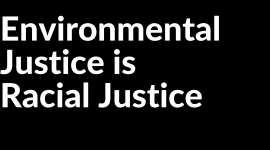Environmental Justice is Racial Justice: IEC's Continuing Journey
posted
on Wednesday, February 10, 2021
.jpg) May 25, 2020 was the day George Floyd was murdered in Minneapolis and the U.S. erupted. For some in our nation, it was yet another heartbreaking, incomprehensible injustice and a continuation of protest in a decades-long struggle. For others, it was a devastating awakening to the racism embedded in our society. Hundreds of thousands of people across the country, and here in Iowa, responded with a call to change.
May 25, 2020 was the day George Floyd was murdered in Minneapolis and the U.S. erupted. For some in our nation, it was yet another heartbreaking, incomprehensible injustice and a continuation of protest in a decades-long struggle. For others, it was a devastating awakening to the racism embedded in our society. Hundreds of thousands of people across the country, and here in Iowa, responded with a call to change.
It wasn’t just individuals responding to that call. Businesses and organizations across the nation named themselves complicit in structural racism and stated that change was due in the way they conducted their business. The Iowa Environmental Council was one of those organizations, recognizing we had much to learn and many opportunities for change. It was a vulnerable time and remains so, as our staff and board candidly speak with one another of our concerns and our thoughts for growth. We want to be sure we aren’t just talking about change, but taking action as well.
Following the release of an organizational statement in June, IEC continued internal work to address our own actions. We formed a justice, equity, diversity, and inclusion (JEDI) steering committee and held internal workshops to talk about personal and professional blind spots, challenges, and areas for learning and improvement. Staff created a resource library, regularly sharing relevant content, events, and ideas to increase awareness and action. That work is ongoing.
In the fall, we started a months-long exercise to identify ways we can better engage as members of the global community, support others in their community-building work, and increase diversity and inclusion in environmental efforts. Some examples of the more than 80 action steps include ensuring all spaces we contract for events include handicap accessibility and access via public transit, translating our environmental resources into other languages, inviting and publishing guest blog content, and sponsoring events hosted by BIPOC-led organizations. Importantly, we recognize that we are not always the experts in this space and seek to partner and learn from others.
While we have a long way to go on our journey, we are encouraged as we look back at several positive steps:
 IEC and 100% Iowa sponsored Transit Equity Day on February 4, a day honoring the action of Rosa Parks and calling for equity and access in public transit. We published a blog authored by a local bike enthusiast on what the day and issue means to her as a Black cyclist in Des Moines.
IEC and 100% Iowa sponsored Transit Equity Day on February 4, a day honoring the action of Rosa Parks and calling for equity and access in public transit. We published a blog authored by a local bike enthusiast on what the day and issue means to her as a Black cyclist in Des Moines. - Award winners, speakers, and panelists at our Bright Ideas Breakfast, ProH2O, Wild and Scenic Film Festival, and others have reflected a diverse group of people working in the environmental and community-building space. We continue to seek out and welcome these important voices.
- IEC convened a fall retreat for member organizations featuring a powerful presentation on the roots of environmental injustice in Iowa from respected national speaker Ricardo Salvador.
- We have begun to regularly share and recommended environmental justice and racial equality resources, tools, and events online and in our newsletters. See our event calendar for upcoming opportunities.
In January, we published our JEDI principles to guide us in the next phases of our work. We are committed to increasing the diversity of our staff and board, and the coalition of partners we work with across the state. This means we are committed to listening, learning, and following the lead of organizations that work in the environmental and racial justice space and communities disproportionately impacted by environmental pollution and climate change. We look forward to strengthening our existing relationships and building many new connections in the months ahead. We must transform as an environmental movement in Iowa to fulfill our mission and to secure just, equitable, anti-racist environmental policies.
 We are working toward being a better organization. We want to become better citizens of our communities and our country. Placing JEDI at the foundation of our work requires focus in deconstructing systemic inequities in our society and dismantling the bias and privilege in our selves is worth every moment of reflection and connection. We invite you to walk with us on this journey as we work together to make Iowa a better place for all to live, work, and explore.
We are working toward being a better organization. We want to become better citizens of our communities and our country. Placing JEDI at the foundation of our work requires focus in deconstructing systemic inequities in our society and dismantling the bias and privilege in our selves is worth every moment of reflection and connection. We invite you to walk with us on this journey as we work together to make Iowa a better place for all to live, work, and explore.
This blog post was authored by IEC's JEDI steering committee, comprised of Brian Campbell, Michael Schmidt, Alicia Vasto, Paige Penningroth, and Raihan Rashidi.
- environmental justice